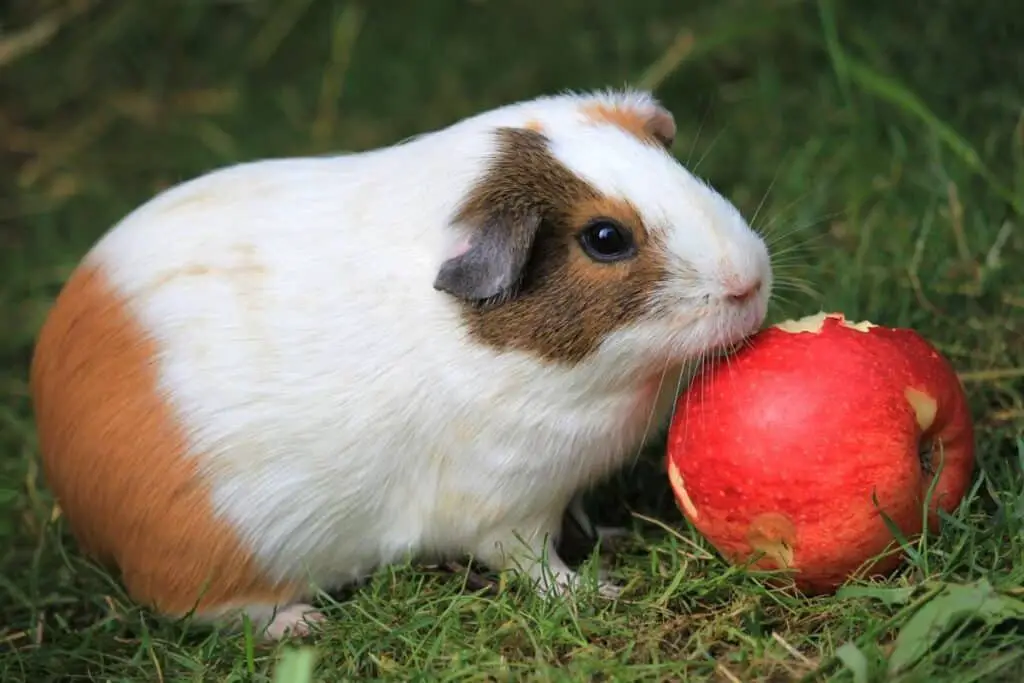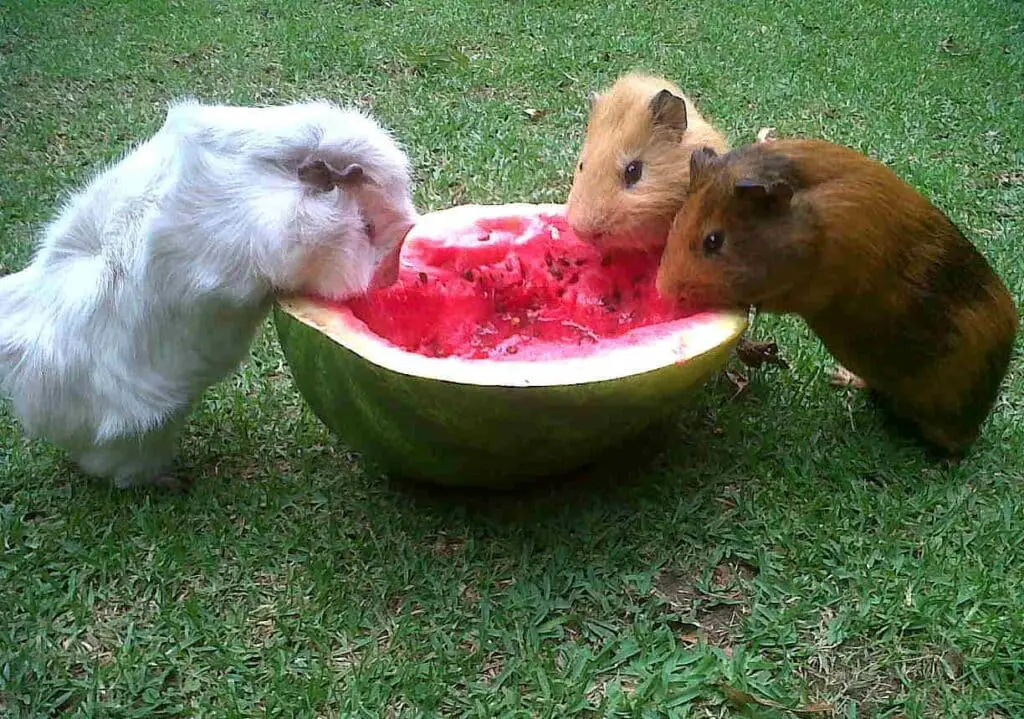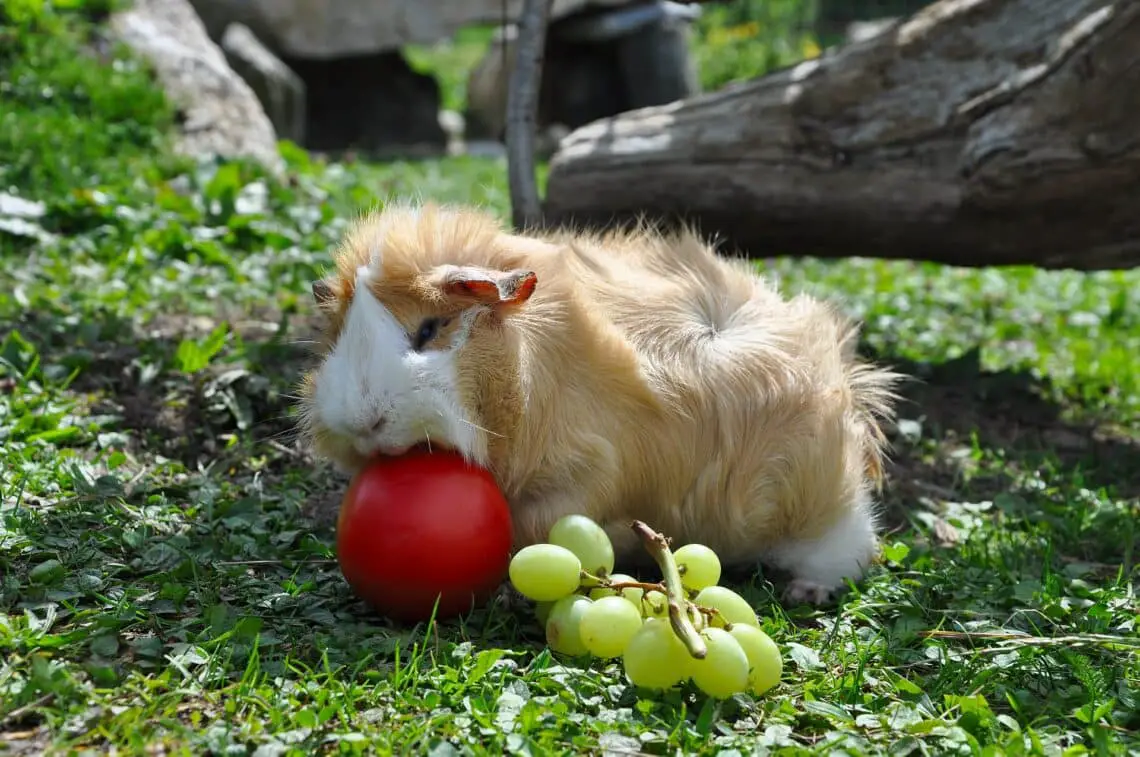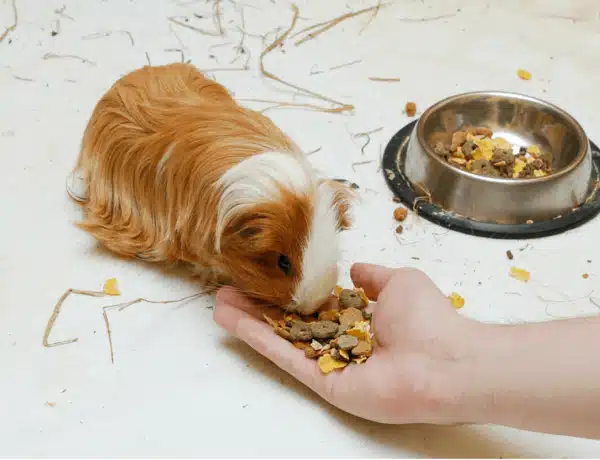Introduction
What Fruit Can Guinea Pigs Eat: Fruit works well as an occasional treat that is offered once a day or several times a week. Keep the portion size small since fruit is high in sugar; a small wedge of orange or apple, several blueberries or a thin slice of banana is perfectly adequate. Kiwis, strawberries and citrus have high levels of vitamin C.
Guinea pigs are adorable and sociable little creatures that make wonderful pets. Their small size and gentle disposition make them a popular choice among pet enthusiasts. Fruits can be a delightful addition to a guinea pig’s diet, offering both nutrition and variety to their meals. However, not all fruits are safe for these furry companions, and some should only be given in moderation due to their high sugar content. Knowing which fruits are suitable and in what quantities is key to maintaining your guinea pig’s well-being.
The vitamin C-rich options that can boost their immune system to the fiber-packed choices that support their digestion, we will provide you with the knowledge you need to make informed decisions about your guinea pig’s diet.

What fruit is best for guinea pigs?
The Guinea pigs recommend fruits which include: apples, strawberries, blueberries, grapes, and oranges. Fruits and veggies should be fed to guinea pigs in small, bite-sized portions throughout the day.
When it comes to selecting the best fruit for guinea pigs, it’s essential to prioritize their health and nutritional needs. While guinea pigs enjoy a variety of fruits, some are better suited for their well-being than others.
The top choice for guinea pigs is undoubtedly bell peppers. Although technically a fruit, they are an excellent source of vitamin C, a crucial nutrient for guinea pigs since they cannot produce it on their own. Bell peppers come in various colors, offering variety and visual appeal to their diet.
Strawberries are another excellent option, being rich in vitamin C and fiber. However, due to their sugar content, it’s important to feed them in moderation.
Oranges and kiwis also provide a good dose of vitamin C, but they are high in sugar, so they should be offered sparingly.
Blueberries are a safe and nutritious choice, packed with antioxidants and vitamin C.
Apples are a guinea pig favorite, but they should be given in moderation due to their high sugar content. Be sure to remove the seeds and core.
What fruits can guinea pigs not eat?
Persin is found in all parts of the avocado including the fruit, skin, seeds, stem, and leaves. Toxic amounts of persin can damage a guinea pig’s heart muscle within 24 to 48 hours, potentially leading to congestive heart failure if not promptly treated.
Ensuring the well-being of your guinea pig involves not only knowing what they can eat but also being aware of fruits that are off-limits. Some fruits can be harmful to guinea pigs due to various reasons, including high sugar content, acidity, or toxic compounds.
Citrus Fruits: Oranges, lemons, limes, and grapefruits are too acidic for guinea pigs and can lead to digestive issues and mouth sores.
Grapes: Grapes, both red and green, should be avoided as they are small and can pose a choking hazard. Their high sugar content can also lead to obesity and dental problems.
Cherries: Cherry pits contain cyanide, which is toxic to guinea pigs. Even pitted cherries should be avoided due to their high sugar content.
Peaches and Plums: The pits or stones in these fruits contain cyanide, making them dangerous for guinea pigs. The flesh itself is also relatively high in sugar.
Avocado: Avocado contains a substance called persin, which can be toxic to guinea pigs and may lead to digestive issues and respiratory problems.
Rhubarb: Rhubarb leaves are highly toxic to guinea pigs and should never be fed to them. Even the stalks, while less toxic, are not recommended due to their high oxalic acid content.
Fruit Seeds and Pits: Seeds and pits of various fruits, like apples, pears, and peaches, should be removed, as they may contain cyanide or present choking hazards.
High-Sugar Fruits: Fruits like bananas, mangos, and pineapples are high in sugar and should be offered only in small amounts as occasional treats.
It’s crucial to be cautious when introducing new foods to your guinea pig’s diet. Their sensitive digestive systems may not tolerate certain fruits or vegetables well. Always consult with a veterinarian or do thorough research before offering any new food items to ensure the safety and well-being of your beloved guinea pig.
Can guinea pigs eat papaya?
Guinea pigs can eat papaya, but in moderation. Just like with most fruits, papaya has lots of sugar, so it’s important to make sure that you feed it to them in smaller amounts. There are several benefits and drawbacks to consider before you decide to include it into your guinea pig’s diet.
Guinea pigs can indeed eat papaya, and it can be a delightful addition to their diet when offered in moderation. Papaya is a tropical fruit that offers several nutritional benefits for these small rodents.
One of the primary advantages of feeding papaya to guinea pigs is its high vitamin C content. Guinea pigs, like humans, cannot synthesize their own vitamin C and rely on dietary sources to meet their needs. Papaya provides a significant dose of this essential nutrient, contributing to their overall health and immunity.
Papaya is rich in dietary fiber, which supports healthy digestion in guinea pigs. The fiber helps regulate their gastrointestinal system, preventing issues like constipation or diarrhea.
When introducing papaya to your guinea pig’s diet, it’s crucial to do so gradually and in moderation. Offer small, bite-sized pieces to prevent choking hazards, and remove any seeds or skin. Due to its natural sugar content, it’s best to treat papaya as an occasional snack rather than a daily staple to avoid overloading guinea pigs with sugars.
The guinea pigs’ primary diet should consist of hay, fresh vegetables, and high-quality guinea pig pellets. Papaya can be a tasty and nutritious treat to complement their diet, but it should not replace their essential nutritional staples. As with any new food, monitor your guinea pig’s reaction, and if they show any signs of digestive upset, discontinue feeding papaya and consult with a veterinarian.
When can guinea pigs eat fruit?
Guinea pigs don’t naturally eat fruit, but you can give small amounts as an occasional treat. Fruit is high in sugar, which can cause obesity.
Guinea pigs can enjoy fruits as part of their diet, but it’s essential to offer them in moderation and at the right times to ensure their well-being. Here’s when and how guinea pigs can eat fruit:
Fruits should be considered treats and not a staple of a guinea pig’s diet. They are naturally high in sugars, which can lead to obesity and dental problems if overconsumed. Limit fruit consumption to a few times a week.
Balanced Diet: The majority of a guinea pig’s diet should consist of fresh hay, high-quality guinea pig pellets, and a variety of fresh vegetables. Fruits should complement this diet.
Fresh and Clean: Always offer fresh and clean fruit. Remove any uneaten portions promptly to prevent spoilage and contamination.
Variety: Provide a variety of fruits to add diversity to their diet. Suitable options include bell peppers, strawberries, blueberries, and small amounts of apple or pear.
Avoid Citrus and High-Sugar Fruits: Citrus fruits like oranges and grapefruits are too acidic for guinea pigs. Additionally, limit fruits with high sugar content, such as bananas, mangos, and grapes.
Dental Health: Chewing on the fibrous texture of fruits can help maintain your guinea pig’s dental health, but it should not replace hay, which is essential for keeping their teeth worn down.
Do guinea pigs eat tomatoes?
Guinea pigs can eat a variety of fruits and vegetables but it can be difficult to see which are best, safe and healthy. Tomatoes are safe for guinea pigs to eat. Tomatoes have many beneficial dietary benefits including: Great source of fiber necessary for correct digestive health.
Guinea pigs can eat tomatoes, but it’s important to do so in moderation and with some consideration. Tomatoes are a type of fruit and can provide certain nutritional benefits to guinea pigs.
Tomatoes are a good source of vitamin C, which is essential for guinea pigs since they cannot synthesize it themselves. This vitamin helps support their immune system and overall health. Additionally, tomatoes contain other vitamins and minerals like vitamin K, potassium, and folate, which can contribute to a well-rounded diet.
Portion Control: Tomatoes are relatively high in sugar and acidity. Therefore, they should be given in small, controlled amounts as an occasional treat rather than a daily staple.
Ripe and Fresh: Ensure that the tomatoes you offer are ripe and fresh. Overripe or spoiled tomatoes can lead to digestive issues.
Remove Seeds and Green Parts: The seeds and green parts of tomatoes can contain alkaloids, which are not suitable for guinea pigs. Always remove these parts before feeding them to your pets.
Monitor for Allergies or Digestive Issues: Some guinea pigs may have sensitivities or allergies to certain foods, including tomatoes. Introduce tomatoes gradually into their diet and monitor for any adverse reactions.
Guinea pigs can enjoy tomatoes in small quantities as part of a balanced diet. They provide a source of vitamin C and other nutrients but should not replace the primary components of their diet, which should consist of hay, fresh vegetables, and guinea pig pellets. Always prioritize moderation and the overall health of your guinea pig when offering them tomatoes or any other treats.
Can guinea pigs eat bananas?
Bananas are an excellent source of vitamin C and potassium, both of which are vital to a guinea pig’s diet. But, as with all good things, serving in moderation is key. Guinea pigs can eat bananas, but it should be given in moderation due to its high sugar content. Bananas are a sweet and flavorful treat that can be a tasty addition to your guinea pig’s diet when offered responsibly.
Here are some key points to consider when feeding bananas to your guinea pigs:
Moderation: Because of their sugar content, bananas should be considered an occasional treat rather than a daily staple in a guinea pig’s diet. Limit the amount to a small slice or chunk at a time.
Nutritional Benefits: Bananas are a good source of vitamin C, which is important for guinea pigs because they cannot produce this vitamin on their own. They also contain vitamin B6, potassium, and dietary fiber.
Freshness: Always offer fresh and ripe bananas to your guinea pigs. Avoid feeding them overripe or spoiled bananas, as these can lead to digestive issues.
Peeling: It’s best to remove the banana peel before giving it to your guinea pig, as the peel can be tough and may be challenging for them to digest.
Variety: Guinea pigs thrive on a varied diet. While bananas can be a delicious treat, they should be part of a broader range of fruits, vegetables, hay, and pellets to ensure a balanced nutrition.
Monitor for Allergies or Digestive Issues: Like with any new food, introduce bananas gradually and observe your guinea pig for any adverse reactions, such as digestive upset.
Guinea pigs can enjoy a small amount of banana as an occasional treat, but it should not replace their primary diet of hay, fresh vegetables, and high-quality guinea pig pellets. Responsible feeding and variety in their diet are key to maintaining the health and happiness of your furry companions.
What is the best diet for a guinea pig?
The preferred basic diet for guinea pigs is unlimited amounts of timothy or other low-calcium hay, supplemented with smaller amounts of commercial, high-fiber, timothy-based guinea pig pellets. Vitamin C should be given each day. Hay should be offered free-choice throughout the day.
The best diet for a guinea pig is one that replicates their natural nutritional needs, ensuring they receive the right balance of nutrients to support their health and well-being. Here’s a breakdown of the components that make up the ideal guinea pig diet:
Hay: The foundation of a guinea pig’s diet should be high-quality hay, such as timothy hay, orchard grass hay, or meadow hay. Hay provides essential fiber, which aids in digestion, keeps teeth healthy by promoting natural chewing, and prevents obesity.
Fresh Vegetables: Guinea pigs benefit from a variety of fresh vegetables daily. Leafy greens like romaine lettuce, spinach, kale, and parsley are excellent choices. Bell peppers, cucumber, zucchini, and carrots are also suitable options. These vegetables provide essential vitamins and minerals.
Guinea Pig Pellets: High-quality guinea pig pellets should make up a portion of their diet. Look for pellets that are specifically formulated for guinea pigs and do not contain excessive fillers, nuts, or seeds.
Fruits (in moderation): Fruits like bell peppers, strawberries, blueberries, and small amounts of apple or pear can be offered as occasional treats. These provide vitamin C and variety but should be given sparingly due to their sugar content.
Fresh Water: Always provide access to fresh, clean water. Ensure the water bottle is checked and refilled daily.
Vitamin C: Guinea pigs cannot produce their own vitamin C, so it’s important to offer a vitamin C supplement if their diet doesn’t provide enough naturally. However, many fresh fruits and vegetables contain sufficient vitamin C.
Avoid Processed Foods: Stay away from processed or sugary treats, as they can lead to obesity and other health issues.
The guinea pigs have sensitive digestive systems, so any dietary changes should be made gradually. A well-balanced diet, rich in hay and fresh vegetables, is essential for maintaining your guinea pig’s overall health, promoting dental health, and preventing common health problems. Always consult with a veterinarian for personalized dietary recommendations for your guinea pig.
Can guinea pigs eat mango?
It’s ok for guinea pigs to like other fruits and vegetables, moderation is key in order to achieve a well-balanced diet that gives the best nutrition for your guinea pig.
Guinea pigs can eat mango, but it should be given in moderation and with some important considerations. Mango is a tropical fruit known for its sweet and juicy flesh, and while it can be a tasty treat for guinea pigs, it should be offered carefully due to its high sugar content.
Here are some key points to keep in mind when feeding mango to your guinea pig:
Moderation: Mangoes are relatively high in natural sugars, so they should be considered an occasional treat rather than a regular part of a guinea pig’s diet. Limit the amount to a small piece or slice at a time.
Portion Control: Since guinea pigs have sensitive digestive systems, it’s crucial to provide only a small portion to prevent potential digestive upset.
Freshness: Offer fresh and ripe mango. Overripe or spoiled mango can lead to digestive issues.
Remove the Pit: Always remove the large pit or seed from the mango as it can be a choking hazard.
Variety: While mango can be a tasty addition to their diet, it should not replace the primary components of their diet, which should consist of hay, fresh vegetables, and high-quality guinea pig pellets.
Monitor for Allergies or Digestive Issues: Introduce mango gradually and monitor your guinea pig for any adverse reactions, such as diarrhea or digestive discomfort.
Guinea pigs can enjoy a small amount of mango as an occasional treat, but it should be given sparingly and as part of a well-balanced diet. Always prioritize their overall health and dietary needs to ensure they remain happy and healthy.

Conclusion
The understanding of what fruits guinea pigs can eat is essential for maintaining their health and happiness as beloved pets. While fruits can be a delightful addition to their diet, it is crucial to approach their consumption with care and moderation.
Guinea pigs can enjoy a variety of fruits that offer valuable nutrients, particularly vitamin C, which is vital for their well-being. Options like bell peppers, strawberries, and blueberries are excellent choices, providing both flavor and nutrition. However, it’s essential to remember that fruits are naturally high in sugars, so they should be considered treats rather than dietary staples.
Balancing their nutrition is key, as guinea pigs require a diverse diet that includes hay, fresh vegetables, guinea pig pellets, and only occasional fruit treats. Ultimately, providing the right fruits in the right quantities contributes to a well-rounded and enjoyable diet for guinea pigs. Prioritizing their dietary needs and overall well-being ensures that these small, charming rodents can lead happy and healthy lives as part of your family. Always consult with a veterinarian for personalized dietary guidance to meet your guinea pig’s specific requirements.





No Comments